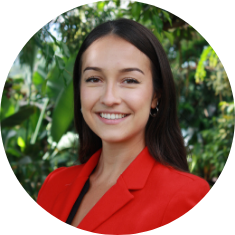
Emily Sousa
Role: HPQ Scholar
Degree: M.Sc.
Primary Faculty Advisor: Wayne Caldwell
Department: Rural Planning and Development
Where are you from: Oxford County, Ontario
How did you learn about the HQP program?
I learned about the opportunity when I was an undergraduate student working as a research assistant to graduate students enrolled in the HQP program. I heard about their experiences participating in multidisciplinary projects and collaborating with graduate researchers from other departments, which piqued my interest. These anecdotes signalled that there was a place for me in the diverse area of agri-food to participate and contribute to the program while also taking advantage of prospects available to further my professional and personal development.
Why were you interested in participating in the program?
I was interested in participating in the program because I recognized that it is a valuable and unique opportunity to gain specialized practical work experience as a graduate student. The opportunity to participate in the program, specifically the innovation and entrepreneurship in agri-food systems course, and the opportunity to partner with the City of Guelph, allowed me to gain the necessary experience to sustain a career as a rural planner while contributing to the development of the dynamic agri-food sector of Ontario. The HQP program is an excellent opportunity to collaborate with many stakeholders in agri-food to provide cutting-edge solutions to sustaining Ontario’s rapidly evolving agricultural industry. In addition to conducting research and gaining practical workplace experience, the opportunity to be a part of the HQP program has provided avenues for mobilizing student research and knowledge on the ground through networking events.
What aspect of the program do you think had the most impact on you?
The collaborative and interdisciplinary nature of the program and community-engaged scholarship had the most significant impact on me. I partnered with the City of Guelph and other community stakeholders, including Wellington County, 10C, Innovation Guelph, and Solid Waste Resources Guelph. Through this aspect of the program, I recognize the value and possibilities of collaborating and leveraging a diversity of specialized skill sets when we break out of our disciplinary silos. I found myself simultaneously learning and developing skills outside of my comfort zone while also contributing to creating innovative opportunities to advance the economic, social, and scientific well-being of our food systems and agri-food industry.
How did the program challenge you/help to prepare you for your future career?
I worked on a community project called the Guelph-Wellington Smart Cities’ Our Food Future, which enabled me to develop project management, program and plan evaluation, and stakeholder engagement abilities. My work with Smart Cities stakeholders in identifying indicators for circular practices in the agri-food value chain helped me recognize gaps in my skill set, such as technical evaluation skills. It inspired me to learn and improve this skill set through additional training opportunities. I now have policy, plan, and program evaluation skills that will be valuable to many professional practice settings.
What are you most proud of in regards to your time in the program?
I am most proud of the industry contacts I made during my time in the program. We had several guest lectures and seminars hosted by industry contacts, such as representatives from the Ontario Federation of Agriculture and the Ontario Soil and Crop Improvement Association. In these sessions, we had the chance to network with these contacts and learn how we could collaborate with them in the future as researchers or professionals.
What advice would you give the next cohort of the HQP program?
I would advise the next cohort of HQP students to seize every opportunity that comes their way, to keep an open mind, and take on unfamiliar experiences to develop new skill sets. Remember and recognize that we are only getting started as leaders in agri-food. As high achievers, it is easy to feel overconfident in our abilities as professional researchers and forget that we are students here to use this opportunity to grow and learn. Take advantage of what comes your way to try something new and perhaps open a new door for personal and professional growth.

